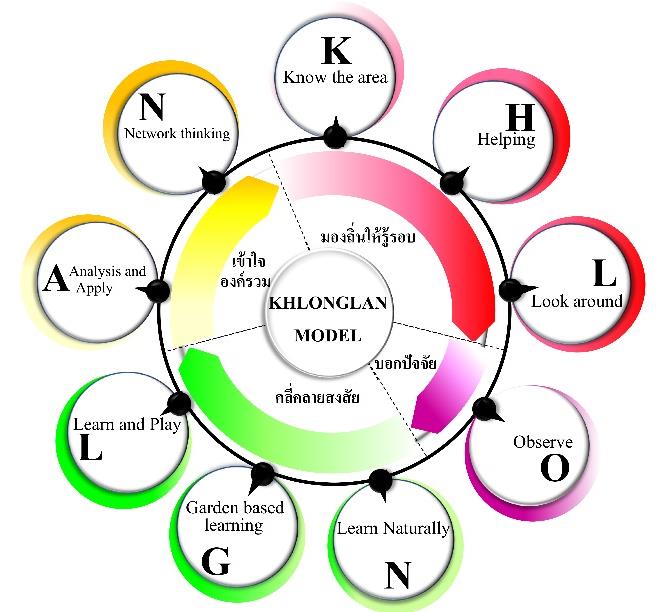Geographical Literacy Learning Management Model to Enhance Holistic Thinking Skills: Case Studies of Registered Gluay Kai Kamphaeng Phet as Geographical Indications by Using Banana Garden as Based Learning
Keywords:
Learning management model, Geography, Holistic thinking, Gluay Kai Kamphaeng Phet, Geographical indicationsAbstract
This study had two objectives: 1. To study the current situations and the need in geographical literacy learning management 2. Develop a geographical literacy learning management model to enhance holistic thinking skills: case studies of registered Gluay Kai Kamphaeng phet as geographical indications by using banana garden as based learning. This is qualitative research by Inductive methodology. The main informants were three group comprised of students, geography teachers, and banana experts include farmers who have experience about Gluay Kai Kamphaeng Phet, and District Agricultural Extension Officers. There were 64 participants and the scope of studying was the secondary school in Khlonglan District. Using registered Gluay kai Kamphaeng Phet as geographical indications garden in Khlonglan District, the data was analyzed by analytic induction from informants in each group and the statistics used for data analysis were frequency and percentage from the interview, focus group discussion, and method triangulation together with methodological triangulation. The results of this study found the current situations and needs in geographical literacy learning management. The first ranking is hands-on activities with 100%, the second is readiness of equipment and teaching materials, the use of community learning resources and the expertise of the teachers with 69.23%, the third is the literacy of the learners and the activities that enhance thinking with 61.54%, the fourth is time spent with 53.85%, the fifth is local pride with 46.15%, the sixth was fun activities with 38.46%. The data was brought into groups and the information used to create a learning management guideline on four issues: 1) Organizing learning activities outside the classroom 2) Learning management that allows students to actually practice 3) learning management that focuses on developing thinking skills 4) Learning management that emphasizes happiness and fun, and then uses the learning management approach to create three principles of learning management: 1) building pride in local farming methods 2) developing thinking skills using geographic processes and 3) child-centered learning. The researcher created a geographical literacy learning management model to enhance holistic thinking skills by using Gluay kai Kamphaeng Phet as geographical indications-based learning through the Enhance GI Kamphaeng Phet Activity, which consists of four steps: “Mong Tin Hai Rob Roo” (insightful knowledge of the local community), telling the factors, disentanglement of the suspect, and understanding all of the content in holistic manner from the results of this study. Creating the KHLONGLAN Model can lead to be the model for managing geography courses that promote holistic thinking skills. This gives learners holistic thinking skills at a very good level. Students come up with thoughts that connect the relationship of various environmental and physical factors, namely, the species of Gluay Kai, territorial conditions, climate, density, fertilizer, minerals, moisture, care, and people using the local Kamphaeng Phet banana plantation learning resources.
References
สำนักงานคณะกรรมการการศึกษาแห่งชาติ. พระราชบัญญัติการศึกษาแห่งชาติ พ.ศ. 2542 และที่แก้ไขเพิ่มเติม (ฉบับที่ 2) พ.ศ. 2545. กรุงเทพฯ: บริษัท พริกหวานกราฟฟิก จำกัด; 2545.
อดุลย์ วังศรีคูณ. การศึกษาไทยในศตวรรษที่ 21: ผลผลิตและแนวทางการพัฒนา. วารสารมนุษย์ศาสตร์และสังคมศาสตร์ บัณฑิตวิทยาลัย มหาวิทยาลัยราชภัฏพิบูลสงคราม 2557;8:1-17.
กระทรวงศึกษาธิการ. ตัวชี้วัดและสาระการเรียนรู้แกนกลาง สาระภูมิศาสตร์ (ฉบับปรับปรุงพ.ศ. 2560) กลุ่มสาระการเรียนรู้สังคม ศึกษา ศาสนา และวัฒนธรรม ตามหลักสูตรแกนกลางการศึกษาขั้นพื้นฐาน 2551 และแนวทางการจัดการเรียนรู้. กรุงเทพฯ: ชุมนุมสหกรณ์การเกษตรแห่งประเทศไทย; 2560.
กนก จันทรา. การรู้เรื่องภูมิศาสตร์ Geo-Literacy Learning for our Planet ถอดบทเรียนประสบการณ์การจัดการเรียนรู้ภูมิศาสตร์ในชั้นเรียนที่เสริมสร้างการรู้เรื่องภูมิศาสตร์. กรุงเทพฯ: สำนักพิมพ์แห่งจุฬาลงกรณ์มหาวิทยาลัย; 2561.
อมรรัตน์ ศรีเจริญ. การพัฒนาทักษะการคิดองค์รวมของนักเรียนระดับมัธยมศึกษา [วิทยานิพนธ์ปริญญาครุศาสตร์มหาบัณฑิต]. กรุงเทพฯ: มหาวิทยาลัยเทคโนโลยีพระจอมเกล้าธนบุรี; 2548.
ธีรวุฒิ เชื้อพระชอง. การจัดการเรียนรู้กระบวนการภูมิศาสตร์ เพื่อพัฒนาทักษะการคิดแบบองค์รวมของนักเรียนชั้นมัธยมศึกษาตอนปลาย โรงเรียนสารภีพิทยาคม. วารสารสังคมศาสตร์และมานุษยวิทยาเชิงพุทธ 2564; 16:412-24.
ออมสิน จตุพร และอมรรัตน์ วัฒนาธร. แนวคิดการศึกษาอิงสถานที่: การพัฒนาความเป็นพลเมืองดีให้แก่เยาวชนโดยใช้บริบทชุมชนท้องถิ่นเป็นฐาน. วารสารสงขลานครินทร์ ฉบับสังคมศาสตร์และมนุษย์ศาสตร์ 2558;21:81-112.
สันติ ศรีสวนแตง. การจัดการเรียนรู้โดยใช้สวนเกษตรเป็นฐาน. นครปฐม: เพชรเกษมการพิมพ์; 2556.
สำนักงานเกษตรและสหกรณ์จังหวัดกำแพงเพชร. กล้วยไข่ จังหวัดกำแพงเพชร [อินเทอร์เน็ต]. 2564 [เข้าถึงเมื่อวันที่ 9 เมษายน 2565]. เข้าถึงได้จาก https://www.opsmoac.go.th/kamphaengphet-performance-preview-431391791835
ชนิดา จิตตรุทธะ. ระเบียบวิธีวิจัยเชิงปริมาณกับระเบียบวิธีวิจัยเชิงคุณภาพ: ความแตกต่างของความเชื่อทางญาณวิทยา. วารสารการจัดการสมัยใหม่ 2552;7:13-26.
เอื้อมพร หลินเจริญ. เทคนิคการวิเคราะห์ข้อมูลเชิงคุณภาพ. วารสารวัดผลการศึกษา มหาวิทยาลัยมหาสารคาม 2555;17:17-29.
ลัดดาวัลย์ สำราญ. การวิเคราะห์ข้อมูลและการนำเสนอผลวิจัยเชิงคุณภาพ [อินเตอร์เน็ต]. [เข้าถึงเมื่อ 1 เมษายน 2565]. เข้าถึงได้จาก https://sites.google.com/site/laddawansomeran/home?authuser=0
พิชิต ฤทธิ์จรูญ. เกณฑ์การให้คะแนน: เครื่องมือสำหรับครูเพื่อประเมินผลลัพธ์การเรียนรู้ที่เที่ยงตรงและยุติธรรม. วารสารศึกษาศาสตร์ มสธ. 2562;12:1-16.
กระทรวงศึกษาธิการ. หลักสูตรแกนกลางการศึกษาขั้นพื้นฐาน พุทธศักราชการ 2551. กรุงเทพฯ: ชุมนุมสหกรณ์การเกษตรแห่งประเทศไทย; 2551.
สุดารัตน์ ยอดมงคล. รูปแบบการจัดการเรียนรู้บูรณาการแบบองค์รวมเพื่อส่งเสริมการคิดอย่างมีวิจารณญาณ วิชาสังคมศึกษาระดับประถมศึกษา. วารสารเทคโนโลยีภาคใต้ 2560;10:19-25.
วิไลภรณ์ ฤทธิคุปต์. การจัดการเรียนรู้โดยใช้ชุมชนเป็นฐาน: กลยุทธ์การจัดการเรียนรู้ที่มีประสิทธิภาพของครูในศตวรรษที่ 21. วารสารบัณฑิต มหาวิทยาลัยราชภัฏเชียงราย 2561; 11:179-91.
ถิรวุฒิ สารขวัญ. การพัฒนาการเรียนการสอนด้วยวิธีการเรียนรู้แบบการค้นพบโดบใช้โปรแกรมกูเกิ้ลเอิร์ธในวิชาภูมิศาสตร์ ของนักเรียนระดับชั้นมัธยมศึกษาปีที่ 1. วารสารวิชาการครุศาสตร์อุตสาหกรรม พระจอมเกล้าพระนครเหนือ 2562;10:122-30.
Demirci A. How do teacher approach new technologies: Geography teachers’ attitudes towards geographic information systems (GIS). European Journal of Education studies 2009; 1:43-53.
ทิศนา แขมมณี. ศาสตร์การสอน องค์ความรู้เพื่อการจัดกระบวนการเรียนรู้ที่มีประสิทธิภาพ.กรุงเทพฯ: สำนักพิมพ์แห่งจุฬาลงกรณ์มหาวิทยาลัย; 2561.
Worth K. Garden-Based Learning [Internet]. 2015 [cited 2022 April 8]. Available from: https://www.edutopia.org/blog/garden-based-learning-kristin-stayer
อภิเดช ช่างชัย. การพัฒนากิจกรรมการเรียนรู้ด้านเกษตรโดยการมีส่วนร่วมของชุมชน: กรณีศึกษาโรงเรียนสาธิตแห่งมหาวิทยาลัย เกษตรศาสตร์ วิทยาเขตกำแพงแสน. Veridian E-Journal, Silpakorn University 2560;10: 1544-60.
อัจฉรา ศรีพันธ์. การศึกษาบนฐานชีวิตและชุมชน:เมื่อประชาชนลุกขึ้นมาปฏิรูปการศึกษา.กรุงเทพฯ: แดเน็กซ์อินเตอร์คอร์ปอเรชั่น; 2561.
Learning hrough Landscapes. School orchards. Winchester: United Kingdom; 2019.
อรนุช ลิมตศิริ. การจัดกิจกรรมการเรียนรู้นอกห้องเรียนสำหรับเด็ก. วารสารมนุษยศาสตร์และสังคมศาสตร์ มหาวิทยาลัยราชภัฏบ้านสมเด็จเจ้าพระยา 2564;15:234-58.
ชัยวิชิต เชียรชนะ. การสร้างและการพัฒนาโมเดล/รูปแบบ/แบบจําลอง/ตัวแบบ. วารสารศิลปากรศึกษาศาสตร์วิจัย 2560; 9:1-11.

Downloads
Published
Issue
Section
License
บทความทุกบทความที่ตีพิมพ์ในวารสารการพัฒนางานประจำสู่งานวิจัย (JPR2R) ถือว่าเป็นลิขสิทธิ์ของวารสารการพัฒนางานประจำสู่งานวิจัย คณะสิ่งแวดล้อมและทรัพยากรศาสตร์ มหาวิทยาลัยมหิดล





